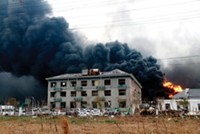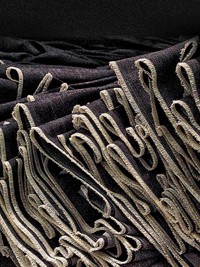Advertisement
Grab your lab coat. Let's get started
Welcome!
Welcome!
Create an account below to get 6 C&EN articles per month, receive newsletters and more - all free.
It seems this is your first time logging in online. Please enter the following information to continue.
As an ACS member you automatically get access to this site. All we need is few more details to create your reading experience.
Not you? Sign in with a different account.
Not you? Sign in with a different account.
ERROR 1
ERROR 1
ERROR 2
ERROR 2
ERROR 2
ERROR 2
ERROR 2
Password and Confirm password must match.
If you have an ACS member number, please enter it here so we can link this account to your membership. (optional)
ERROR 2
ACS values your privacy. By submitting your information, you are gaining access to C&EN and subscribing to our weekly newsletter. We use the information you provide to make your reading experience better, and we will never sell your data to third party members.
Business
French Firm Revamps Chinese Aroma Plant
Rhodia's experience confirms that some Chinese exporters run dirty and dangerous operations
by Jean-François Tremblay
November 29, 2004
| A version of this story appeared in
Volume 82, Issue 48

Rhodia got an eye-opener following its 2000 acquisition of a Chinese producer of the flavor ingredient vanillin. The company that it bought turned out to be putting its workers at risk, trampling on Chinese environmental standards, and ignoring an international agreement banning the use of benzene as a solvent.
He says his company bought the operation, Ruohai Fine Chemicals in Xuebao, Zhejiang, as a means to establish itself in China. Although Ruohai was the country's newest vanillin plant, Rhodia managers knew from visiting it several times before the purchase that it was not up to world standards. It had no computers; no documentation; and no health, environmental, and safety policies. But only after they took possession of the unit did they find out how awful it really was. "It's like buying a house," Giannotta says. "You might find some problems during several visits, but it's only when you actually live there that you get the full picture."
The French company discovered that, contrary to what it had been told, the plant dumped untreated effluent into a nearby river. It got rid of its toxic tar waste haphazardly, dumping it both on the plant site and in nearby fields it didn't own. But worst was that Ruohai's production process required the use of benzene as a solvent. Because benzene causes cancer, the International Labor Organization, to which China belongs, banned its use as a solvent in 1971.
Using benzene as a solvent to make an aroma for human consumption is, according to Giannotta, beyond belief. And yet there are actually buyers for such a product. "This may be shocking to you, but there are many formulators of aromas that will buy this vanillin because it's very price-competitive," he says. Makers of major consumer brands are meticulous in ascertaining that their suppliers comply with high standards. But smaller companies, Giannotta laments, lack "the desire to look behind the curtain."
The fundamental problem with the plant Rhodia bought, Giannotta says, was its production process. Rhodia's vanillin plants in the U.S. and France react guaiacol with glyoxylic acid to obtain vanillin. Rhodia makes the guaiacol using catechol as the starting material. Ruohai's route, in contrast, made use of o-nitrochlorobenzene to obtain guaiacol, which it then converted to vanillin.
Compared with Rhodia's process, the Ruohai route was producing more end-of-pipe effluents, three to five times more solid waste--tars that required treatment--and five times more volatile organic compounds, a third of which was benzene. "As you walked by the workshop, you'd get your lungs full of benzene," Giannotta says. He adds that the process required twice the amount of toxic raw materials and that operators at the plant were exposed to four times more toxics.
Giannotta says there are still two plants in China--and nowhere else--that use a process similar to Ruohai's. But it's an unsustainable method of production, he says, yielding low-cost vanillin at the expense of adequate health, safety, and environmental practices. Even in China, authorities are becoming increasingly zealous in policing polluters. Under regulatory pressure to raise their operating standards, Giannotta says, two Chinese vanillin producers have shut down since 2000.
AFTER THE acquisition, Rhodia completely overhauled the Ruohai plant, Giannotta says, adding a water treatment unit and an incinerator for the tars. The plant's 140 workers now follow clear hygiene, safety, health, and environmental procedures. And Rhodia has modified the process so that it no longer uses o-nitrochlorobenzene as a raw material nor benzene as a solvent. Guaiacol is sourced from a nearby joint venture between Rhodia and Japan's Ube Industries that, in turn, gets its catechol from Rhodia plants in Europe and the U.S. By integrating its raw material supply chain while using a cost-effective catechol production route, Rhodia can hold its own against the remaining Chinese producers, Giannotta says.
He concedes that tests may show that vanillin made using the o-nitrochlorobenzene route is of acceptable quality and purity. However, he also notes that potential buyers should be concerned that vanillin comes from plants where benzene is used as a solvent and where health standards are so lax that the product could suffer contamination from pests such as rats or cockroaches.
By going public with Rhodia's findings, Giannotta hopes that buyers will shun the worst of the Chinese-made vanillin. "I agree that competition is stimulating, but there are rules that need to be respected in the food industry," he says.
Rhodia, the world's largest producer of vanillin, is perhaps motivated by self-interest in sharing what it discovered through the acquisition of a plant in China. But the company's initiative provides a unique insight into the methods of Chinese companies whose prices are too good to be true.





Join the conversation
Contact the reporter
Submit a Letter to the Editor for publication
Engage with us on Twitter